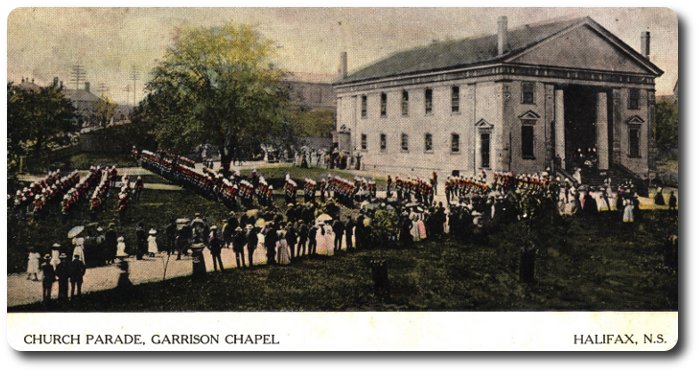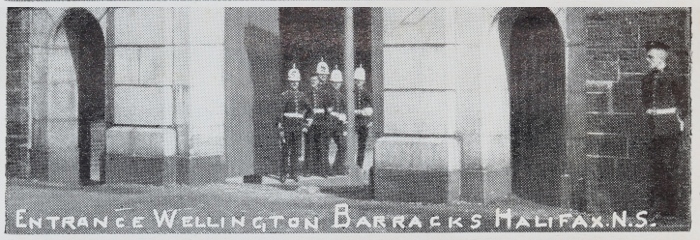Topic: Canadian Militia

Garrisoning Halifax (1905)
Boston Evening Transcript; 5 May 1905
Canadians Not Martial
They Refuse Offer of Garrison Enlistment
Dominion Cannot Man the Coast Fortifications
Hardly a Hundred Men Take the Service
Washington, May 5—A Halifax despatch says:
Canada's attempt to garrison the fortifications at Halifax and Esquimault, B.C., with Canadian troops has, it is stated, practically failed. The recruiting officers sent to the cities and towns of the Dominion have been unable to enlist more than one hundred men. The Government also held out tempting offers to young Englishmen of military ambition to enlist in the Canadian army, but very few took advantage of the opportunity. Under the new plan the Imperial troops were to have left Halifax in July, but from the present outlook they will remain on this station for at least two years longer. So far, Canada has not sufficient troops to take over the garrisons, and a prominent imperial officer declares that the Fifth Royal Garrison Regiment will remain in Halifax, and that the Canadian Government will annually contribute $850,000 toward the maintenance of the Imperial troops.
Removal of the British garrisons in Canada, at first explained as a merely strategic measure for releasing the troops to other and more necessary service, was really a concession to Canada's desire for something approaching an independent establishment. The garrisons have been small, and their only usefulness, aside from showing Imperial sovereignty, was to keep up the fortifications. The Dominion Government has long contributed to the cost of keeping up and improving the coast fortifications, and it was gratifying to its pride to have them given into her exclusive charge. In 1903 an elaborate reorganization of the militia was begun, and it was announced that a naval reserve would be established by the incoming Parliament. These plans seem to have originated at the imperial conference of 1902, and to have taken definite shape about the time when Sir Frederick Borden, Canada's minister of militia and defence, was welcomed, in 1903, to the Imperial Defence Committee in London. An expert of the Royal Engineers, Captain Naish, soon afterward came out to serve the militia department as advisor on fortifications. An Ottawa Council for military administration, on the plan of the new London system, replaced the antiquated, unworkable scheme in which a general officer commanding was a perennial friction-maker. The limitation of the chief command to an officer of Old Country regulars was done away with. Ottawa's vote for military purposes was increased about one-half. This appeared superfluous at the time, but later all signs deemed to point to a previously concealed concert of Ottawa and London to put on Canadians the proper responsibility for their own defence.

Boston Evening Transcript; 8 May 1905
Garrisoning Halifax
Canada Has Not Scored a Failure
Officials at Ottawa Deny the Reports That Not Enough Canadians Are Volunteering — Preparations for the Transfer Are, However, Proceeding Slowly, and the Date May Be Postpones — The Terms of Enlistment Comparatively Liberal — Respects in Which They Might Be Improved
By: E.W. Thomson
(Special Correspondence of the Transcript)
Ottawa, May 8—Officials of the Militia Department here deny the report that Canada has failed to enlist enough men for the permanent Dominion forces which are to replace the imperial garrisons at Halifax and Esquimault. Plenty of good men have volunteered and as many as are presently needed have been accepted. Reports to the contrary are fatuously spread by persons who dislike the transfer of the fortified places to Canada or who imagine that they may serve their own interests by trying to create an impression that the transfer will not be effected. There is not even a "hitch" in the process of devolution though it is true that the formal transfer may not occur as early as was expected, viz., on the first of July. The British War Department moves slowly and there is in the case no need for hurry. Indeed, some benefits may accrue from a few weeks or even months delay. Canada has plenty of men, but not plenty of trained men. You can't make efficient artillerymen and engineers in half a year. Certain experts of the imperial service may linger for some considerable time, aiding to train those who are to succeed them. It is possible some of the old country skilled men may be induced, by the goodwill of both Governments, to accept transfer from the Imperial to the Canadian service. Working out the details of the transfer takes time, it may take a trifle more time than was expected and that, according to the officials here, is all there is to the story that has been sent from Halifax to the United States press.
The total enlistment will be of about two thousand men. They are invited, by placards placed in many public places, to join "the permanent forces of Canada." Lord Dundonald wished Dominion forces to be dubbed "the Canadian Army," or the "Army of Canada," but the saving sense of humor intervened against the proposal. Also, it was obnoxious to the general Canadian dislike for and fear of "militarism." The country will be able to minimize or magnify its "permanent forces," or let them vanish away as softly if less suddenly than the Snark, without incurring the reproaches or suspicions that arise from monkeying with an "Army."

To suppose that an abandonment of Canada by Great Britain is signified by the withdrawal of imperial forces, and the transfer of Halifax to those of Canada, is to wholly mistake the significance of the proceedings. The United States does not abandon Massachusetts in leaving the State military to the State—if one may say this without being supposed to misunderstand the relations of the State to the Federal Government. Great Britain does voluntarily, as a matter of high policy, what Washington has to do by the Constitution of the republic. Canada has gradually assumed voluntarily what Massachusetts retained on entering the Union—control of her entire militia system, and the taking over of Halifax and Esquimault is as if Massachusetts soldiers were to garrison federal fortifications in Massachusetts. The cases do not run exactly on all fours but there is no more breach of political connection in one instance of garrisoning than in the other.
The cheerful thing to observe is that John Bull has at last got it through his head that Canada is to be trusted to the last degree. And if Canada, of course the other great self-governing colonies. Now this implies, as surely as confidence begets affection in honorable hearts, a new drawing together of the British world. It implies at once an enhanced Colonial disposition to stand by the Old Country, and an increase of Colonial forces, voluntarily, the creating of new power to back up hearty sentiments. This results from a step in decentralization. What more probable than that the process of decentralization will thus be encouraged anew. Is not the very idea on which the programme of Imperial Federation began likely to be supplanted by the idea that a congeries of independencies under the common crown is the true solution of the British problem? It would seem that the great dream of Imperial Federation has performed its appointed work. Its champions, working twenty-five years with a splendid enthusiasm, have so affected the general hearty that their own plan is seen to be superfluous. A formal bond, a leash, could be but an embarrassment, a hindrance, to those on whom fortune and independence devolve by the same affections of the mothers, to whose glory and preservation they are bound by ties for which the words blood, and language, and gratitude, and history are but passionless symbols for sentiments that must endure as long as hearts throb and blood runs.

